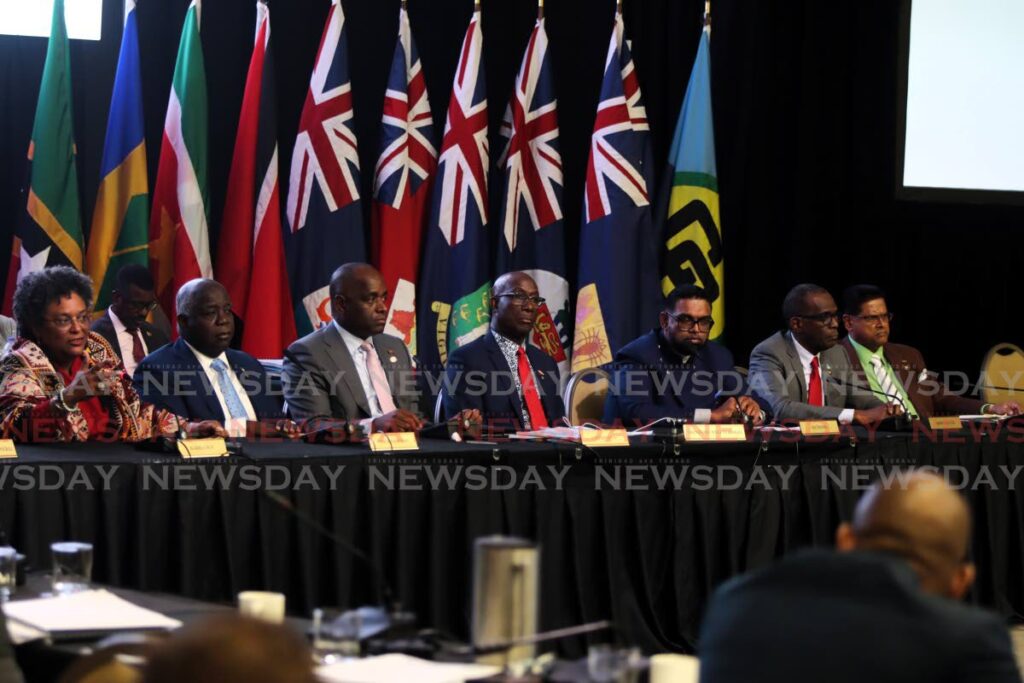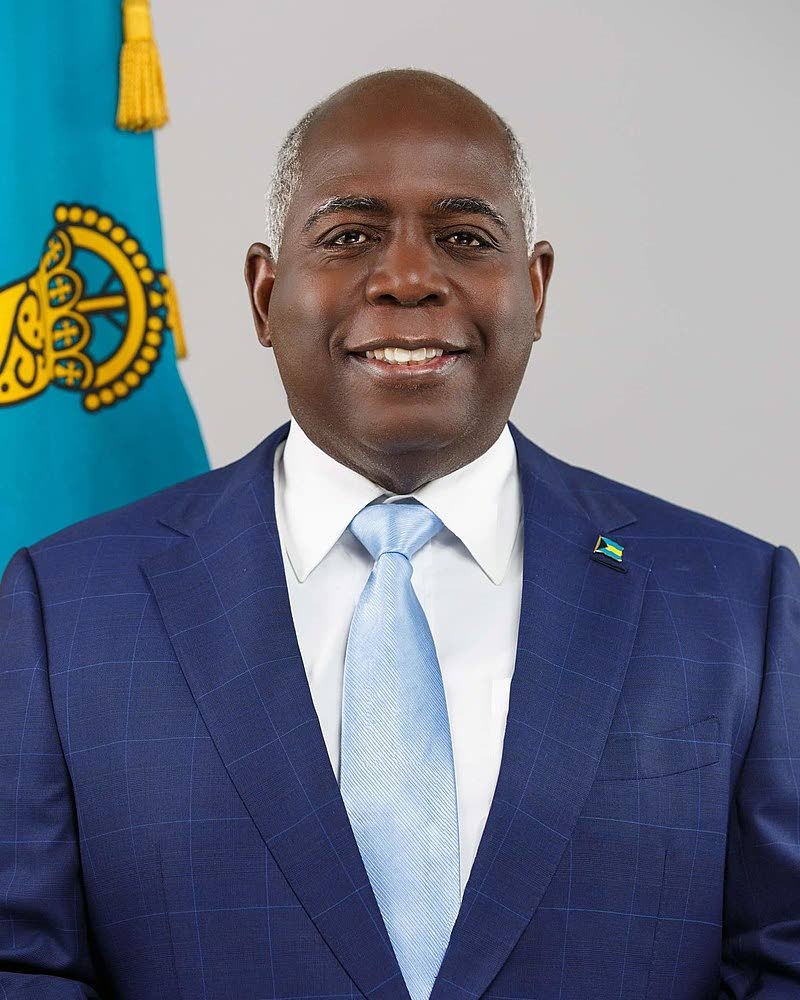Cryptocurrency regulations evolving, says Bahamian PM

The Bahamas, in 2020 dared to make themselves the location for cryptocurrency transactions through its Digital Assets and Registered Exchanges (DARE) act in 2020, welcoming cryptocurrency companies such as FTX to its shores to do business in the digital currency.
But coming out of the company’s collapse in November last year, it would seem to some that it took the Bahamas down with it, with some questioning the financial reputation and the viability of its policies on cryptocurrency in the small island with big ambitions.
However, Bahamian Prime Minister Philip “Brave” Davis – speaking at the TT Coalition Service Industries' "Doing business with the world series" last Friday at the Hyatt Regency, Port of Spain – said it was because of the regulations that the country was able to respond to the implosion of FTX.
Doubling down, Davis said the policies on digital currency is continuing to evolve with new innovations coming up.
He told reporters that the experience that the Bahamas had with FTX has not changed, in fact, he believes that more and better regulations would help cryptocurrency evolve.
DAREing to act on cryptocurrency
The DARE act came into effect in the Bahamas on December 14, 2020. It created a legal definition for digital assets and designed a regulatory framework for digital asset business and activities permitted in the Bahamas.
The act requires issues to comply with several obligations including providing an offering memorandum which will detail the objectives, risks and terms of investments in cryptocurrency; continuing disclosure on the status of investments and a maintenance of the purchasers’ rights to rescission or damages and withdrawal.
The DARE act gave digital asset providers, especially ones based outside the Bahamas, the option of putting its name on a registry.
A commission will keep a register of the initial token offerings containing special information.
Other aspects of policies in the act include standards for addressing conflicts of interest or connected third party relationships; transactions as a part of a reward program; definitions for digital assets used within a video game; and restrictions on proof of work or mining of digital assets in or from within the Bahamas.
Davis spoke in defence of the regulatory framework established by the act and said the DARE act was able to help the Bahamian government protect investors even as FTX crashed.
“The FTX experience has not changed our view of the regulatory regime in the Bahamas at all,” he said, responding to questions at the Hyatt. “We were able to step in and get control of the assets because of the regulations.”

(Photo courtesy Office of the Prime Minister of Bahamas website) -
He explained that although the coins – known as FTTs – did not have the same value, the coins were still there.
He advised those with coins to hold on to them to see how the market behaves.
“Sometimes you have to be vigilant to see how the trends are going and once you see the trend you are able to get ahead of it, and cut your cloth to suit, so to speak, to protect customers and investors from what I call the bad actors,” he said. “We’ve been successful in that regard and we have not lost any business.”
FTX and the Bahamas
FTX was established in 2019 by Sam Bankman-Fried and exploded in the Bahamas with massive physical institutions and promotions across the island.
But everything came crashing down in late 2022, amid several cryptocurrency institutions’ failures.
In early November 2022, a report by CoinDesk – a news site specialising in bitcoin and digital currency – highlighted potential leverage and solvency concerns involving the FTX-affiliated trading firm Alameda Research, also owned by Bankman-Fried.
CoinDesk said Alameda Research was heavily dependent on the FTT with about US$5 billion in FTX’s assets.
The company’s balance sheet was leaked, and it showed that there was a lack of diversification between the two companies.
As a result the company ran into liquidity issues because the value of the coin plummeted, prompting a run on the digital asset company, meaning that several customers began withdrawing their currency and cashing out.
FTX scrambled to get bailouts to cover the mass withdrawal, which Binance – the global company which oversees the largest cryptocurrency exchange, – promised to facilitate, but after conducting due diligence, changed its tune and walked away from the bailout on November 9.
The very next day the Bahamian government froze the assets of the FTX subsidiary there, and by November 11, Bankman-Fried stepped down as FTX’s CEO and was replaced by a court-appointed CEO with the task of restructuring the company. The company then filed a chapter 11 bankruptcy claim for protection.
On November 12, FTX reported an alleged hack that resulted in up to US$477 million vanishing into thin air.
The Bahamian government then moved the remaining assets for security purposes on November 18. On December 12, Bankman-Fried was arrested on fraud and money laundering charges and ten days later released on a US$250 million bond.
Newsday understands that, overall, some US$8 billion in assets were lost. As of January this year, about US$5 billion has been recovered.
It was discovered that Alameda, borrowed capital from FTX out of customer deposits which were later transferred to FTTs, instead of a fiat currency or another cryptocurrency.
Further investigation revealed that FTX’s balance sheets showed that its assets were less than Bankman-Fried stated.
Davis – our Sand Dollar is working
Davis said the Sand Dollar, the Bahamian Central Bank-backed cryptocurrency, is still gaining momentum despite challenges.
Established in 2010 the Sand Dollar was able to meet the challenge of financial inclusion and bankability for Bahamians who otherwise may have to travel by boat to conduct simple banking transactions.
Since then the Eastern Caribbean Currency Union among other countries have also joined the Bahamas in creating its own cryptocurrency.
In an address at the Hyatt, Davis said banks can use digital currency to meet with the challenge of giving millions of unbanked people the opportunity to become bankable.
“For example, we can facilitate pooling of mutual transactions and harmonise our anti-money laundering and counter-terrorism financing processes,” he said.
The chief difference between the Sand Dollar and FTTs is that the Sand Dollar is backed by the Central Bank of Bahamas, which means that it is regulated, stable, private and secure as digital assets could be tracked through the blockchain network to avoid money laundering and financing of terrorism through its use.
“You have to be innovative,” he told reporters in a subsequent interview. “The only challenge is ensuring that we get buy-in from our people and getting them to understand what we are doing.”
He added that the commercial industry also has to buy-in to the idea of cryptocurrency and accept it as a means of transaction.
“I too still like to feel my dollar, I still like to write my cheque. But these are things that we still have to be a part of, otherwise we will be left behind,” he said.

Comments
"Cryptocurrency regulations evolving, says Bahamian PM"